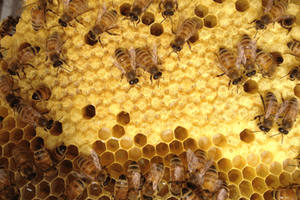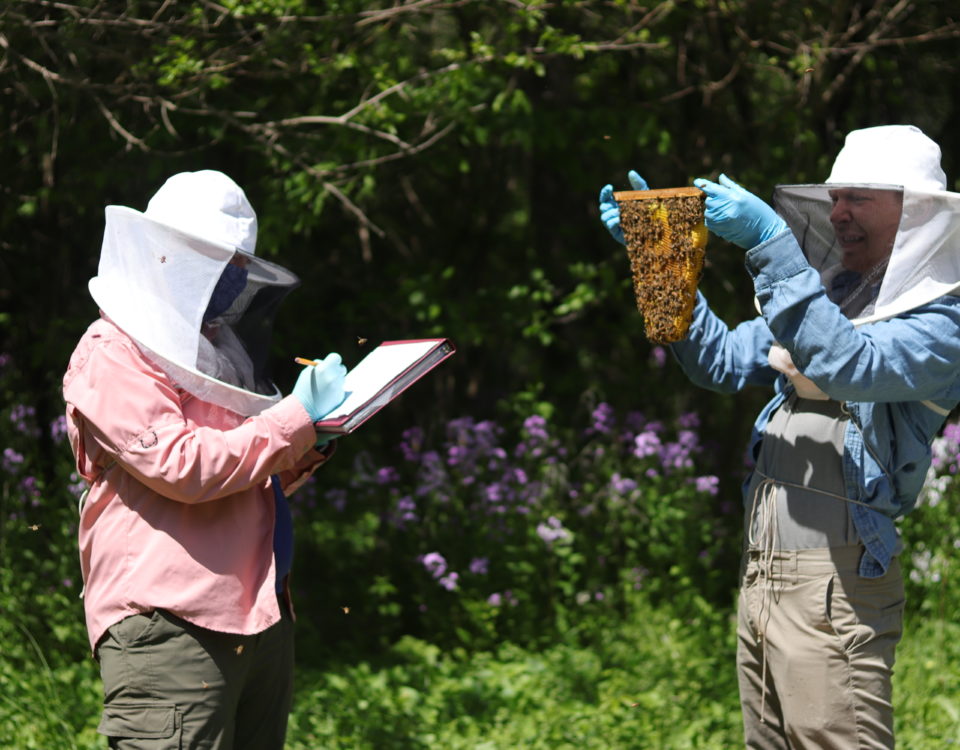- All-In-One Beekeeping for the Bees
- +1-608-728-8233
- info@beepods.com
Where Will Your Food Come From in the Future?

Pollinators and especially honey bees have a more diverse food supply in urban environments creating an ecosystem of higher survival rates and helps to support all pollinator populations.

In this article, we describe just a few of the many benefits behind making honey bees a part of your community garden. Increasing your plants’ yield, providing educational opportunities for the community, and adding diversity to the products that you offer (honey, wax, etc.) are just the tip of the iceberg.
Many city dwellers have begun to see a surge in the number of local urban gardens that are popping up all over their cities or even small communities. The Food and Agriculture Organization of the United Nations estimates that around 800 million people practice urban gardening worldwide. This is no doubt due to the refocus on understanding where our food comes from and how it is grown. Many of us are beginning to understand now more than ever that it is important to not only watch the types of foods that we put into our bodies, but to understand the source – how it is grown, what is used to augment the growth, and even how it is harvested and processed. This has led to a huge boom in weekend warriors and DIYers that are searching for information on growing their own food in the city.
At Beepods, we have been seeing this coming for years – we built the entire beekeeping system around this fact. We wanted someone with a big backyard to be able to keep bees. It’s possible for a resident in a high-rise to be able to keep bees. We believe that it was most important for the schools that are teaching about food systems to start learning how to keep bees in order to share it with all of their students. Here is why we wanted to do this:
Honey bees increase yield and quality of produce in any agricultural area – big or small – in the first year.
While some plants have the ability to self-pollinate, many more require a little bit of help from a pollinator – commonly animals, insects, or the wind – to achieve fertilization. This is where bees come in.

It takes 7 honey bees or other native pollinators to make sure that the most aesthetically pleasing fruit are grown.
Honey bees play a key role in the fertilization of many fruit-bearing plants. In fact, they are estimated to be responsible for approximately 90% of the highly nutritional fruits and vegetables that people need to obtain their daily amounts of vitamins and minerals – that’s 1/3 of the food that we eat! (University of Minnesota) Without the assistance of pollinators such as honey bees, many plants are not able to achieve complete fertilization. So, while they may produce some fruit, it will be undersized and misshapen, and no one wants that, right? By pollinating fruit-bearing plants, honey bees not only help farmers and gardeners to produce more fruit, they aid in the production of bigger, more beautiful fruit as well. So next time you have a delicious berry, thank a honey bee!
Honey bees provide a source for outdoor community-driven education.
In this age of farmers markets, people have begun more and more to want to know more about where their food comes from – where it is grown, how it is grown, and how it is harvested. As our education shifts and becomes more experiential and community driven, there has been a huge uptick in field trips and local outdoor education across the U.S. This is due to the need to build concrete experience, learning from the observations and mistakes that others and we make, growing an understanding, and then building on that understanding to deepen not just basic knowledge, but the application of that knowledge as well.
Many schools have begun including courses dedicated to the growth and production of foods in their curricula, both in the classroom and the greenhouse. A good number of these classes cover the importance of bees to food cultivation, and some even give students hands-on experience with beekeeping! This is very telling of the cultural shift that is happening toward the demand for fresh, sustainably produced foods. An example of this is at the University School of Milwaukee, where Kenneth “Kip” Jacobs teaches his students about growing fruits and vegetables, and how bees play a key role in that process through hands-on experience in the school’s garden. Don’t just take our word for it – hear what Kip has to say about this form of teaching here!

Kenneth “Kip” Jacobs teaches a group of school age children about food systems and bees at University School or Milwaukee. He states that engaging students through the hands on beekeeping and gardening has creates a learning environment where kids learn how the world really works, not just theory.
There has also been a surge in the trend of community gardens, shared plots of land where people who may not have enough of their own land can rent plots in order to garden, whether they want to grow food or flowers. Some of these gardens have their own apiaries, while some rent bees from nearby beekeepers in order to increase pollination in the tenants’ plants. In this way, many people who would have little experience with bees (other than stings!) are able to learn just how important they are to the production of our favorite fruits and veggies.
Honey bees provide great additions to your market offerings (honey, propolis, wax, and other products created from all 3 of these).
After the Great Recession of 2008, many households began to be more aware of ways to save money. According to a 2014 report by the National Gardening Association, from 2008 – 2013, the practice of growing food at home increased by 17%! People’s desire to share their creations with others led to the ever-increasing popularity of local farmers markets, where people not only trade unique artisan crafts and fresh produce, but also knowledge and ideas.
Beyond this, in the age of information, now people can learn how to make household remedies with the type of a keyboard and the click of a mouse. This has not necessarily translated to bigger market shares for many, but has infused their local markets with a slew of new products and consumables that may never have been seen in a town of 10,000 people or fewer. In the Etsy Explosion and the age of Amazon, consumers are no longer reliant on big box stores controlling supply chains.

Pollinators and especially honey bees have a more diverse food supply in urban environments creating an ecosystem of higher survival rates and helps to support all pollinator populations.
People have discovered the great uses of other byproducts from the hive like wax or propolis. It has spurred an insurgence into figuring out other medicinal properties that keeping bees can have, like sting therapy or even work therapy through the calming noise of the buzzing bees and the grounding feeling of working with your hands.
Long story short, Beekeeping is not only important to growing enough high quality food locally, but also to the improvement of cities and small communities across the board. We at Beepods are sure that we have just begun to see the impact of bees on urban gardens. There is more to come, and we can see it rolling in.
Devon Rowley
Latest posts by Devon Rowley (see all)
- Why You Should Purchase the Beepods Online Course - May 16, 2018
- Hive Alive Review - March 16, 2018
- Nucleus Colony or Packaged Bees – Which is right for you? - March 13, 2018



